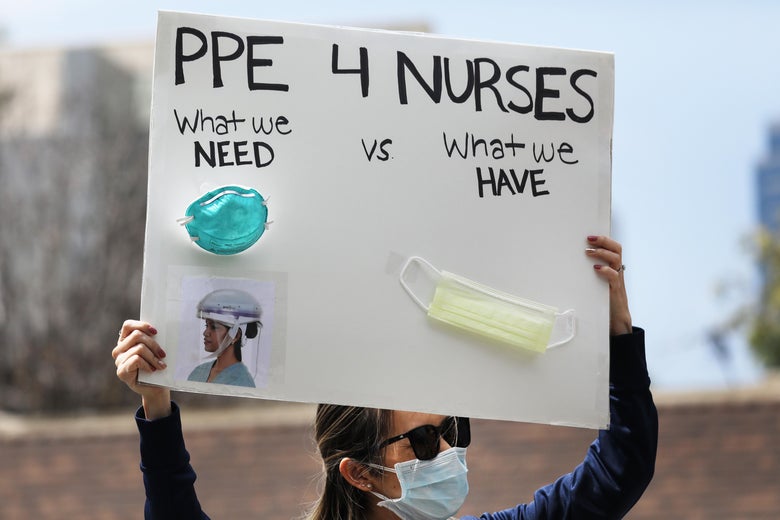
A nurse holds up a sign to protest the lack of personal protective gear available at UCI Medical Center amid the coronavirus pandemic on April 3, 2020 in Orange, California.
Mario Tama/Getty Images
The United States wasted time. A lot of it. And as a result, lost the ability to take control of the coronavirus crisis in time. That is the clear conclusion of two in-depth reports, one published by the Associated Press and another by the Washington Post that reviewed how the Trump administration failed to get ready for the pandemic that has now engulfed the country.
The AP reviewed federal purchasing contracts and reports that federal agencies waited until mid-March to place bulk orders for N95 respirator masks, mechanical ventilators, and other essential equipment for health care workers. When that happened, hospitals were already straining to deal with a surge in patients amid a shortage of equipment. “We basically wasted two months,” Kathleen Sebelius, health and human services secretary during President Barack Obama’s administration, told AP.
Even though officials knew since mid-January that hospitals in China were being overwhelmed by patients who required ventilators, getting the attention of the president and other top officials proved difficult. Instead, the federal government left much of the responsibility to acquire supplies to the states, creating a messy patchwork that saw governors outbid each other for desperately needed equipment. Meanwhile, President Donald Trump seemed to spend more time dismissing talk of the virus as exaggerated and some of his top health officials downplayed the risk to Americans.
The delay in purchases means a huge order for N95 masks from 3M, for example, will not be delivered until the end of April, which is after the projected peak for the pandemic. The administration also ordered 10,000 ventilators in late March, which is not only a far smaller number than what health experts and governors have been saying are needed but they also won’t arrive until the summer or fall. “It’s actually kind of a joke,” an administration official tells the Washington Post.
The Post story makes clear that part of the problem can be traced back to China and its failure to alert the world about the seriousness of COVID-19. Plus in the early days of the outbreak China was refusing to share viral samples that could help the United States develop its own tests. But as many health officials grew increasingly concerned there was seemingly no effort by the White House to take control of the situation to pressure Beijing and come up with alternate plans.
Beyond the number of infections that could have been prevented if the administration had taken leadership of the situation in time, the failure to act has also changed America’s standing in the world. “This has been a real blow to the sense that America was competent,” Gregory F. Treverton, a former chairman of the National Intelligence Council, tells the Washington Post. “That was part of our global role. Traditional friends and allies looked to us because they thought we could be competently called upon to work with them in a crisis. This has been the opposite of that.”
Readers like you make our work possible. Help us continue to provide the reporting, commentary and criticism you won’t find anywhere else.
Join Slate Plusfrom Slate Magazine https://ift.tt/2xP4qV1
via IFTTT
沒有留言:
張貼留言